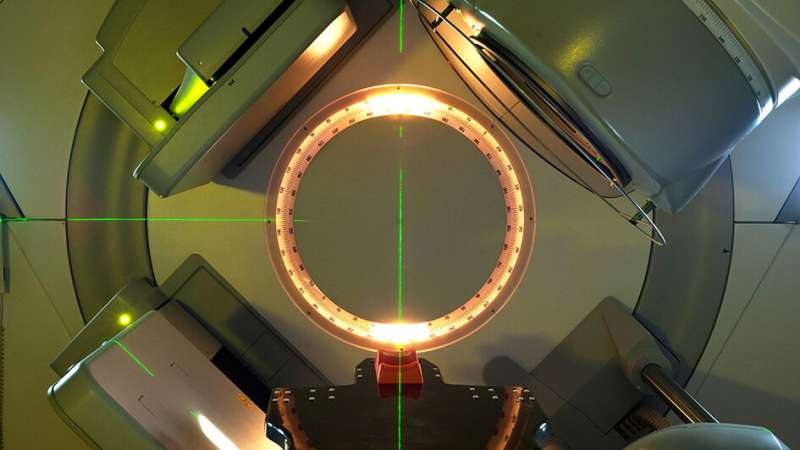
Advanced radiotherapy technology can safely deliver curative treatment for prostate cancer patients in as few as five sessions, with only minimal side effects, according to new research.
This is the first global randomized trial of its kind to compare the long-term toxicity outcomes for prostate cancer patients receiving stereotactic body radiotherapy (SBRT) to those receiving standard radiotherapy treatment. The research was presented at the European Society for Radiotherapy and Oncology (ESTRO) Congress over the weekend.
Minor side effects
The PACE-B trial—taking place at The Institute of Cancer Research, London and The Royal Marsden NHS Foundation Trust, compared the long-term bowel and bladder side effects for patients receiving stereotactic body radiotherapy (SBRT) to those receiving standard radiotherapy treatment.
Researchers found that, two years after treatment, nearly 90% of all patients on the trial experienced only minor side effects. 99% were free of severe side effects, suggesting that shortened treatment can be given without the risk of long-term higher toxicity.
SBRT, which can be delivered on a CyberKnife or standard radiotherapy machines, allows clinicians to target tumors to sub-millimeter precision. It delivers five high doses of radiation to patients over one to two weeks, compared to standard radiotherapy (Intensity-modulated radiation therapy, or IMRT), which delivers more moderate doses over a much longer period of time—usually around 20 sessions, which can take up to one month.
Potentially curative treatment
874 patients with prostate cancer were randomized to two groups. 441 patients were allocated the current standard of care, receiving standard radiotherapy for either 39 doses over seven or eight weeks, or 20 doses over four weeks. 433 patients were allocated SBRT, receiving five doses of treatment over one or two weeks. For both groups of patients, 90 percent of whom had intermediate risk prostate cancer, this was intended to be curative with no further treatment planned.
Patients, recruited from 37 centers across the UK, Ireland and Canada were assessed for side effects every three months for the first two years, incorporating both assessments by clinicians and questionnaires that were completed by patients. Researchers found that patients in both groups had similar levels of side effects two years after treatment, which were very low overall.
There were no differences between the two groups with regards to bowel and rectal side effects but a small difference with urinary toxicity. Results suggested that about one in nine men receiving the SBRT radiotherapy over five sessions will get a moderate bladder side effect two years after treatment, compared to about one in 17 men receiving standard radiotherapy. Bladder side effects experienced by patients included urinary frequency and urgency.
Smarter, better, kinder treatments
Chief Investigator Dr. Nicholas van As is medical director and consultant clinical oncologist at The Royal Marsden NHS Foundation Trust, and Reader in Precision Prostate Radiotherapy The Institute of Cancer Research, London.
He said: “At The Royal Marsden and the ICR, we are focused on developing smarter, better and kinder treatments for patients across the UK and internationally. Developments in radiotherapy, such as SBRT, mean we can target tumors much more effectively.
“It is reassuring to see from this trial that SBRT does not significantly impact patients’ quality of life, compared with the current standard of care. Using SBRT to deliver this treatment would mean that patients could be spared numerous visits to hospital, allowing them to get back to their lives sooner.”
Dr. Alison Tree, consultant clinical oncologist at The Royal Marsden NHS Foundation Trust, and leader of the Uro-oncology Clinical Trials team at The Institute of Cancer Research, London, who presented the data at ESTRO, said:
“Our aim was to understand whether we could safely increase the dose of targeted radiation per day, allowing us to reduce number of treatments required. We wanted to measure whether this could be done without changing the low level of side effects we see with modern prostate radiotherapy.
“When treating patients, we have to consider whether the higher doses in a shorter time period is the best option; the potential side effects are a critical factor in making this decision.
“This data has shown very promising results that suggest potentially curative prostate radiotherapy can be given with very few side effects for patients with stereotactic body radiotherapy over five days.”
Potentially practice-changing
Professor Emma Hall, deputy director of the clinical trials and Statistics Unit at The Institute of Cancer Research, London, that co-ordinated the study, said:
“Now we know that longer-term side effects of SBRT are similar to those with standard radiotherapy. If we can also show that cancer control is no worse, then we expect our trial to be practice-changing”
Colin, 74, from Surrey, was diagnosed with prostate cancer in March this year and received treatment through the PACE trial at The Royal Marsden. He was randomized into the group to receive SBRT and after just five treatment sessions on the CyberKnife, has been assured that his disease has been successfully eradicated.
Colin said: “My diagnosis was quite a shock and being told you need to have radiotherapy treatment is quite nerve-wracking, especially when you’re reading about all the different side effects that could happen. I feel really lucky to have had treatment which was over so quickly; it hasn’t disrupted my quality of life, routine or really stopped me working at all.
“I have suffered no side effects and I feel absolutely brilliant to be told such good news about the treatment outcomes, which coincided with my 50th wedding anniversary –it was a double celebration that weekend!
Source: Read Full Article
